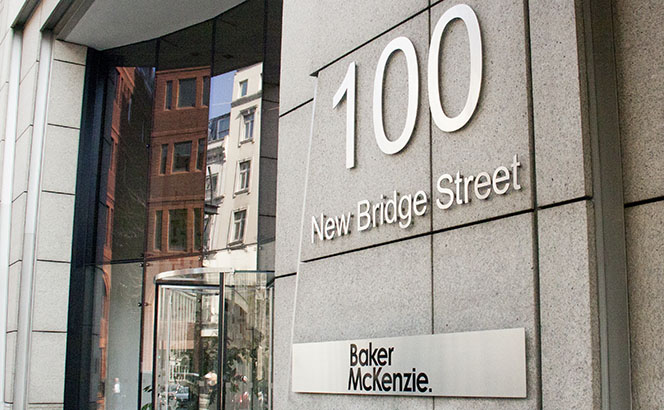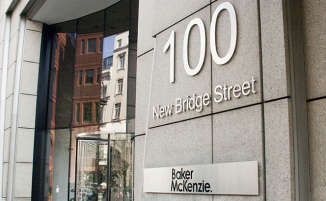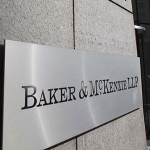Baker McKenzie was accused of ‘collective failure’ for the way it handled allegations of sexual misconduct against its former London head Gary Senior yesterday (2 December), beginning a 15-day Solicitors Disciplinary Tribunal (SDT) hearing.
Solicitors Regulation Authority (SRA) lead counsel Andrew Tabachnik QC of 39 Essex Chambers said the firm allowed Senior to seek to influence the conduct and outcome of an investigation into a complaint made against him by a junior associate.
The associate – referred to as Person A due to reporting restrictions – alleged Senior propositioned her in his hotel room in the early hours of 24 February 2012, made an inappropriate compliment about her appearance and gave her an ‘unwelcome’ and ‘unwanted’ kiss on the neck.
Bakers has also been accused of failing to report the matter to the SRA until February 2018 despite being aware that Senior had sought to initiate intimate activity with the associate, was guilty of a serious error of judgment and that his conduct was aggravated by his seniority. The firm’s former litigation partner, Tom Cassels, and former HR head, Martin Blackburn, are also facing prosecution for their roles in leading the initial investigation into Senior’s misconduct.
‘This is not a case where people apply their minds to the reporting obligations and decide [that] on balance it is not reportable [to the SRA],’ said Tabachnik. ‘This is a situation where no-one thought about it at all, and that’s what makes it culpable.’
The SRA referred Senior, Bakers, Cassels and Blackburn for prosecution in July after details of the episode first emerged in February 2018.
The events in question took place following a firm recruitment event on 23 February 2012. After dinner Senior and a small group of people went to a bar, a night club and then back to his hotel at about 2am, according to Person A.
Finding the hotel bar closed, a group of five ended up in Senior’s room, where they ordered other drinks. At about 3am the party broke up, and Senior and Person A ended up alone, which she says was because he invited her to stay.
Tabachnik said that Senior told Person A she was very attractive, followed by leaning in to kiss her on her neck, which was ‘unwelcome’ and ‘unwanted’. After she had left the room a few minutes later, Senior sent Person A an email saying: ‘Sorry!!’
Tabachnik added that Person A was ‘extremely distressed by the actions of her managing partner’ and ‘didn’t welcome the prospect of any further encounter with him’. He added: ‘She was fearful that her career at the firm would be adversely affected by the fact that she had rejected her managing partner’s advances.’
A few days later, Person A got in touch with Blackburn and Senior issued an apology, saying he was ‘deeply sorry’ and ‘very embarrassed’. Senior added he could see that it was ‘a totally inappropriate situation’, that he respected the way she reacted and this would have ‘no impact whatsoever’ on Person A’s career.
Cassels, who at the time was a member of the firm’s London management committee, was subsequently appointed to lead the investigation into the event. Tabachnik said that neither Cassels nor Blackburn were accused of acting in bad faith or without integrity. He also announced the SRA had dropped one of the original allegations against each of them following the review of the witness statement by person A, meaning they are no longer accused of misleading Person A into believing that the investigation had been undertaken independently of Senior’s influence.
Tabachnik said the investigation process into Senior’s misconduct ‘went far too rapidly with insufficient questions being asked’. He spoke of ‘short soundings’ and ‘barely a piece of paper in sight’, as well as a failure to get the firm’s general counsel properly involved in the process. ‘They were dealing with a notorious micro-manager, they knew there were no boundaries in place, they knew they were dealing with matters that involved investigating one of the key decision makers and there is no evidence of any step taken to prevent [Senior] from influencing the outcome.’
The firm reached a settlement with Person A, who was given two years’ salary plus £15,000 and left the firm. Senior stayed at Bakers and later took on the role of EMEA head. He eventually left last year after details of the event had emerged and has since taken up a role at Finlay Gardener.
Blackburn left Bakers in 2014 and is now UK people director at KPMG, while Cassels joined Linklaters in 2016.
A spokesperson for Bakers said in a statement: ‘We have been co-operating fully with the SRA since the beginning of this process last year. In September 2018, we shared with the SRA the findings of the report we commissioned into the 2012 incident which was carried out in conjunction with the law firm Simmons & Simmons. We’ve learned much from this episode, recognised what went wrong and have well-established and effective policies and programs in place across the firm.’
The trial continues.













